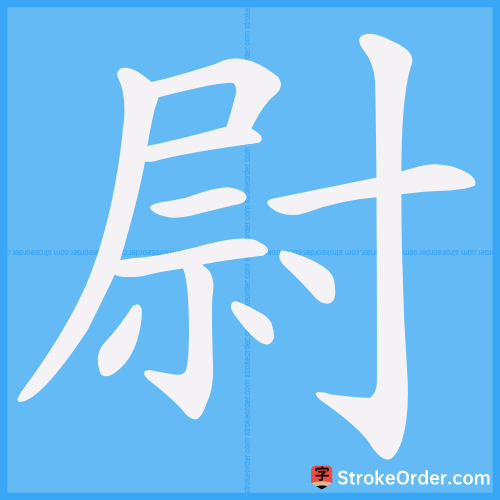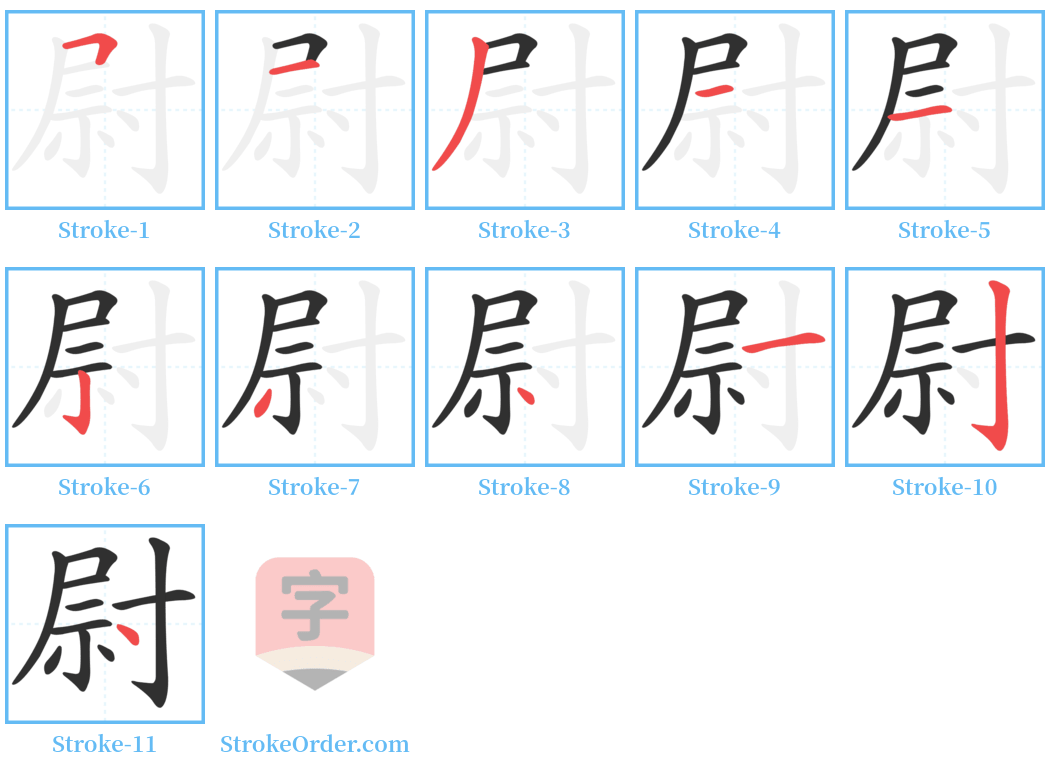尉 Stroke Order
Animated Stroke Order of 尉

Stroke Order Diagrams for 尉

Step-by-Step Handwriting Guide for 尉

Learn to Write Chinese Characters with Video Tutorials
Watch the video of writing the Chinese character "尉", learn the correct stroke order (笔顺) of the character "尉", and master the standard way of writing the character "尉".
Free Printable Handwriting Practice with Stroke Order: 尉
Printable Writing Practice Worksheet of "尉" in Portrait Orientation (Tian Zi Ge)

Printable Writing Practice Worksheet of "尉" in Landscape Orientation (Tian Zi Ge)

Information of 尉
Pinyin
wèi、 yù、 yùn
Radical
寸
Strokes
11 strokes
Usage
★★★★★
Definition
(surname) / milit. official / to quiet
尉 [wèi]
名词
1. 古代官名,一般是武官。
Ancient official title, generally a military officer.
2. 军衔的一级,在校以下。
A military rank (above the rank of warrant officer and below that of major).
3. 〔~氏〕地名,在中国河南省。
A place name, located in Henan Province, China.
4. 姓。
A surname.
本义: 烫平衣服的火斗,熨斗
Original meaning: A flatiron used for pressing clothes.
造字法: 会意。“尉”是“熨”的古字。表示用火熨烫缯布使之平展。
Character formation: A pictophonetic character. "尉" is an ancient form of "熨". It signifies using fire to press fabric flat.
引:
1. 《说文》:尉,从上按下也。…持火以尉申缯也。
(From "Shuowen"): 尉, pressing down from above...holding fire to press silk.
2. 《通俗文》:火斗曰熨。
(From "Tong Su Wen"): The flatiron is called 熨.
例:
又如: 尉斗 (a flatiron used to press clothes with heat).
For example: 尉斗 (a flatiron).
军衔名: 军衔名,分上尉、中尉、少尉,位于士之上,校之下。
Military rank name: Divided into upper lieutenant, middle lieutenant, and junior lieutenant, ranking above soldiers and below majors.
官名: 县官的副职。
Official title: Vice-county magistrate.
引:
1. 宋· 苏轼《石钟山记》:赴饶之德兴尉。
(Song period): “De Xing Wei of Rao”.
2. 清· 周容《芋老人传》:丞尉闻之。
(Qing period): “The deputy heard this.”
3. 清· 邵长蘅《青门剩稿》:陈明选代为尉。
(Qing period): “Chen Mingxuan was appointed as a deputy.”
4. 新尉陈明选。
(New deputy: Chen Mingxuan).
动词
1. “慰”的本字。安慰。
The original form of "慰". To comfort.
引:
1. 《后汉书·王丹传》:所过并使劳尉。
(From "Book of the Later Han"): “Over there made people weary.”
2. 《汉书·胡建传》:所以尉荐走卒。
(From "Book of Han"): “To comfort and recommend quick-footed runners.”
例:
又如: 尉安 (to comfort); 尉承 (to receive comfort); 尉悦 (to feel relieved).
For example: 尉安 (to comfort); 尉悦 (to feel comforted).
尉 [yù]
名词
1. 姓。
A surname.
2. 另见 wèi。
See also: wèi.
引:
1. 《广韵》:尉,姓。古有尉缭子著书。
(From "Guang Yun"): 尉, a surname. There was an author named 尉缭子 in ancient times.
2. 另见 wèi。
See also: wèi.
Input Method for 尉
Pinyin
wei4
Wubi
nfif
Cangjie
sfdi
Zhengma
xmbd
Four Corner
74200
Unicode
U+5c09
Same Pronunciation Characters